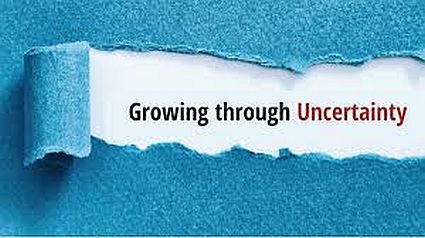It’s human nature to be uncomfortable with uncertainty. We are driven to have answers, to seek solutions. We, often, display avoidance behaviors–persisting in doing things the way we have always done them, even when we know they are no longer effective. We choose to do nothing primarily because we don’t want to face uncertainty.
When we are uncertain, we tend to embrace those who appear to be certain. We respect those that appear to have the answers. To a degree, certainty gives us the feeling of power and control. And we accept them, even if they are wrong, but they enable us to escape the discomfort of uncertainty.
We embrace science and logic to give us answers, even though scientists have long embraced uncertainty as a fundamental in all scientific research.
However strongly we seek to be certain–certainty is out of our control. Burying our heads in the sand doesn’t cause the uncertainty to disappear. We face constant change and disruption. There are few “right answers,” so we struggle with ambiguity.
We tend to develop coping mechanisms, yet few of these directly address the uncertainty.
But what if we changed our view of uncertainty? Perhaps we can’t embrace it, but we can recognize how powerful it can be. We can open ourselves up to rethinking what we do, how we do it. We can explore ideas with others, we can learn, we can experiment, we can innovate.
Without uncertainty, there is little reason to change, grow and improve. We cannot imagine or create something that might be better.
In confronting uncertainty, we have to recognize and embrace the fear that uncertainty may create. We have to become more comfortable with being uncomfortable, but this gives us the opportunity to change. We have to recognize that we may fail, but we must learn from those failures to grow.
We, also, have to recognize there are probably no absolute answers, but answers that help us with the change we are considering. Others will come up with different answers and different approaches.
And we recognize, these are all temporary, because the only constant is change.
Confronting uncertainty requires us to be vulnerable. It requires us to open ourselves to new ideas and different approaches.
Dealing with uncertainty develops our resilience. We learn how to pick ourselves up when we are knocked down.
Developing approaches to manage uncertainty and grow, requires us to collaborate with others, recognizing they are facing the same thing but through their differing experiences, we can grow and develop new approaches, as well as feel less alone.
Changing our perspective on uncertainty, instead of avoiding it, what if we looked at it as a gift? Imagine what we could achieve. Imagine what we could help our people and customers achieve.
Afterword: I found the following resources to be thought provoking about The Gift Of Uncertainty
- Dr. Brittini Brown, The Gift of Uncertainty
- Dave Prakash, Uncertainty: The Best Gift You Never Wanted
- Joanna Macy, The Gifts of Uncertainty

I really de appreciate this article ! This article provides a thoughtful perspective on human discomfort with uncertainty and the tendency to seek certainty. It suggests that embracing uncertainty can lead to innovation, growth, and resilience. The author encourages a shift in perspective, viewing uncertainty as an opportunity rather than something to be avoided. The importance of vulnerability, learning from failures, and collaboration is highlighted as essential in managing uncertainty. Overall, it promotes the idea that uncertainty can be a gift, driving positive change and achievement.
Thanks for sharing